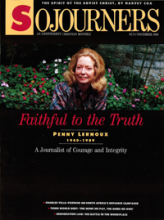You are my God,
I extol you, I praise your name;
for you have carried out your excellent design,
long planned, trustworthy, true.
A mighty people gives you glory,
for you are a refuge for the poor,
a refuge for the needy in distress,
a shelter from the storm,
a shade from the heat.
-- Isaiah 25:1, 3
ISAIAH OFFERS A PRAYER of thanksgiving in chapter 25, a prayer on an exalted but extremely realistic and concrete note. "Thanks for what has been and is." Thanks also for what will be. A strange sort of thanksgiving! It takes into account and includes most awful events that touch -- with a finger of death -- on Isaiah's life.
"You are my God" (verse 1). A revolutionary word indeed, the clearing away of a dense forest of idols. The toppling of false gods, who are in many lives, and as a plain matter of conduct, "my gods."
The verse sings with reasoned clear-sighted ecstasy. The true God has put into the mouth of the prophet a flame of truth. The prophet cries out, knowing Someone is attending.
For most of us, this is a leap in the dark. We neither see nor hear nor touch nor taste; the sense of God is neutral on our tongue and in our mind. It does not touch the heart; the emotional life is not so much drained away as directed elsewhere. We give our hearts, hardly blamefully, to those we know and love -- because we see and hear and touch and kiss. So we plod along, hoping against hope that one day we may pass "from shadows and images into the truth."
Read the Full Article

